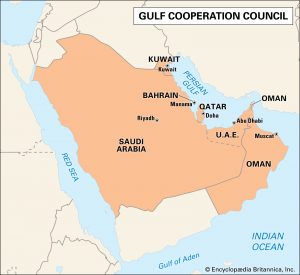Kuwait’s draft expat bill
Background
- The Kuwait National Assembly (NA) is discussing several proposals to reduce the share of foreigners in the country’s population, which is now pegged at 70%.
- There are many proposals under consideration, and one is to put caps on the number of emigrants in the country.
- In this, the plan is that Indians should not exceed 15% of Kuwaiti citizens, while Egyptians, Bangladeshis and Filipinos among others must not each exceed 10% of Kuwaitis.
Why has this proposal come up in the middle of a pandemic?
- Kuwaitis are a minority in Kuwait. Of the total population of 4.3 million, Kuwaitis are 1.3 million, which is less than one third.
- This has been a lingering concern in all Gulf Cooperation Council (GCC) countries — Bahrain, Kuwait, Oman, Qatar, Saudi Arabia and the United Arab Emirates — but the ongoing COVID-19 pandemic renewed the debate.
- In the past, high unemployment among the natives, economic crisis and demographic imbalance had triggered movement for nationalisation of the workforce. Arab Spring added a new concern of political stability among the regimes.
- COVID-19 exposed the huge concentration of certain populations among the expatriates, and the resulting imbalances.
What is the profile of the Indian community in Kuwait?
- There are more Indians than Kuwaitis in Kuwait — 1.45 million, according to one account. However, statistics available on the website of the Indian Embassy in Kuwait puts the number at above a million.
- If Indians cannot exceed 15% of Kuwaitis, the cap would be around two lakh.
- Also, Indians are the largest expatriate community in Kuwait and Egyptians are the second largest.
- In 2018, India received nearly $4.8 billion from Kuwait as remittances.
What happens now?
- Around eight million Indians work in the GCC countries. Around 2.1 million of them are from one State — Kerala.
- Other major contributors to the Indian expatriate communities in GCC countries are Uttar Pradesh, Tamil Nadu, Bihar, West Bengal, Punjab and Rajasthan.
- A renewed push for nationalisation of jobs and diversification of expatriates is possible. However, the structure of the GCC economies makes any dramatic change unlikely.
- Nationalisation of government jobs can be achieved to a significant extent, but the private sector will continue to draw the majority of its workforce from abroad. The costs associated with hiring a citizen are too prohibitive for the private sector, which will leave the country if it is forced to.
- There is a social stratification in GCC countries that has natives at the top, followed by white professionals from the U.S. and Europe, immigrants from other Arab countries and then others including workers from India.
- There is a division of labour among these classes and that cannot be changed in a hurry. Replacement of Indian or Asian workers on a large scale is not possible, and native Arabs will not do certain categories of work.
Related information
About GCC
- The Gulf Cooperation Council is a political and economic alliance of six countries in the Arabian Peninsula: Bahrain, Kuwait, Oman, Qatar, Saudi Arabia and the United Arab Emirates.
- Established in 1981, the GCC promotes economic, security, cultural and social cooperation between the six states and holds a summit every year to discuss cooperation and regional affairs.
-

Subscribe
Login
0 Comments
